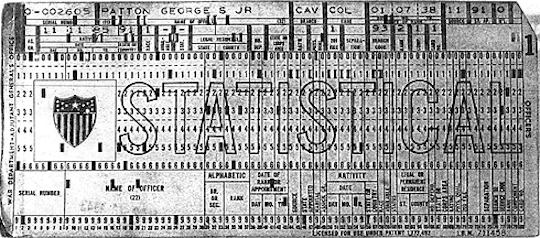What is Memorial Day, Really?
Posted May 27, 2024
Chris Campbell
During World War II, the United States military faced a huge challenge: identifying and honoring fallen soldiers.
No small feat.
With thousands of casualties spread across multiple theaters of war, the task of accurately recording and remembering each individual was daunting.
The U.S. military began using IBM punch card technology in the early 1940s. IBM's punch card machines were utilized for various administrative and logistical tasks, including tracking personnel, supplies, and equipment.
This technology was particularly useful for managing the massive amounts of data generated during the war.

Information in the War Age
These punch card machines were used to create a centralized database of fallen soldiers, including their names, ranks, serial numbers, and other vital information.
This data was then used to generate casualty reports, notify families, and ensure proper burial and remembrance.
The use of this early computing technology during World War II laid the foundation for the development of more advanced databases and information systems in the military.
It also highlighted the potential of machines to assist in the process of honoring and remembering fallen soldiers.
While this is obviously a good thing…
Unfortunately, their stories are all but lost.
What if we could get to know these people as individuals -- not just as serial numbers on a punch card?
Good news for the future:
With the new punch card -- artificial intelligence -- we can preserve our own stories.
AI Helps Save Wisdom
Last Christmas, I got my grandmother a voice recorder for Christmas.
I then handed her a list of 1,000 questions from the “Save Wisdom Project.”
I explained:
Record yourself answering these questions. I’ll transcribe it and turn it into a book you can pass along.
In the past, transcribing 20 hours of audio content would be a NIGHTMARE.
Now? It can be done in less than five minutes using AI.
Not only that, AI can organize the transcript in a way that pulls the scattered stories into a linear narrative about her life.
Of course, I’m not going to have AI write the whole thing for me -- the book would lose its essence. But it will serve as an excellent assistant. 1
Back to Memorial Day:
Build Generational Stories
In a world of rapid tech advancement, it is easy to forget the human stories behind the headlines and the data points.
But the true meaning of Memorial Day is to remember the individuals behind the numbers – the sons and daughters, the mothers and fathers, the friends and neighbors.
Just as early computing technology helped us to better honor and remember the fallen of World War II…
The AI systems of today and tomorrow hold the potential to keep human stories alive in new and powerful ways.
Let’s build generational stories.
